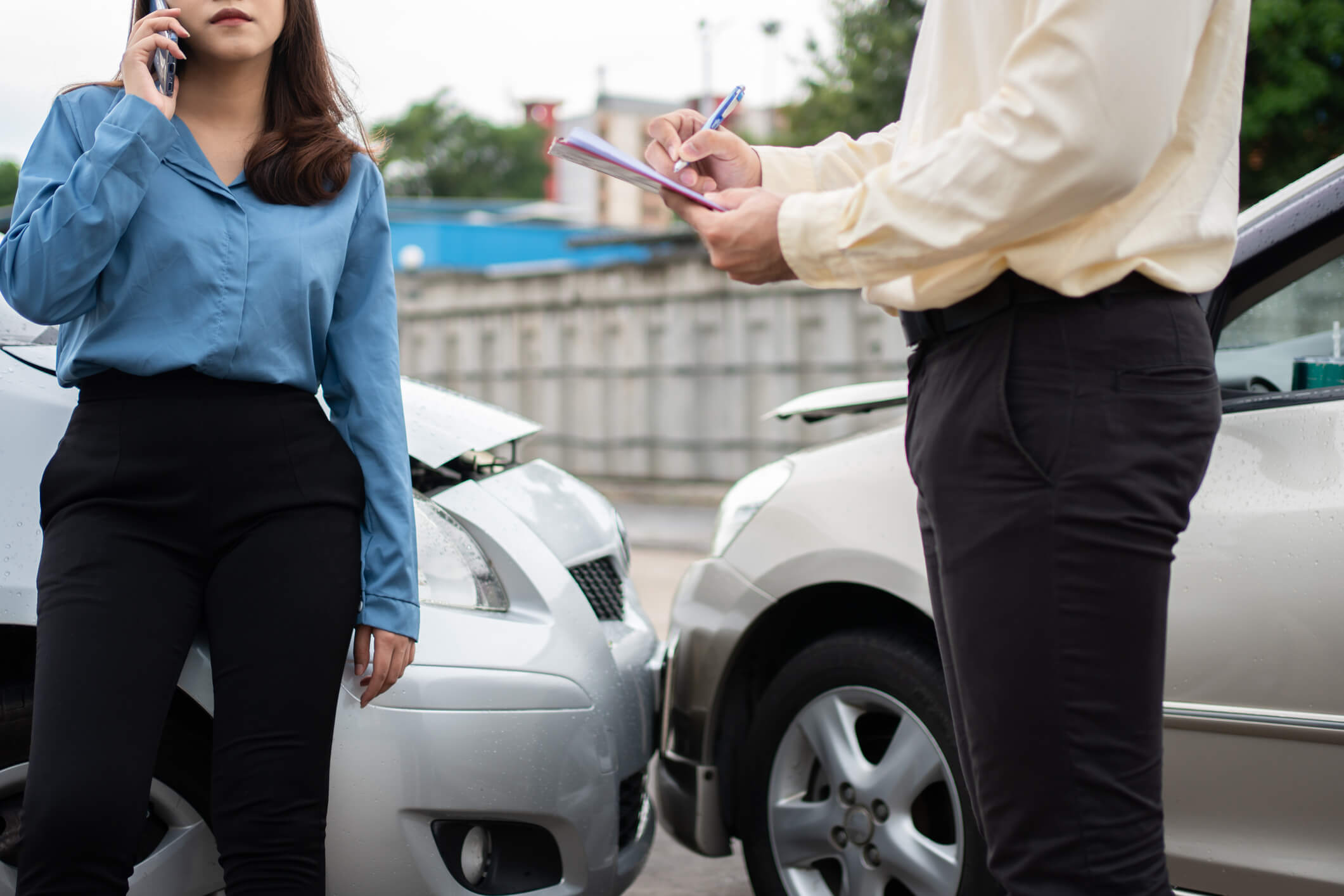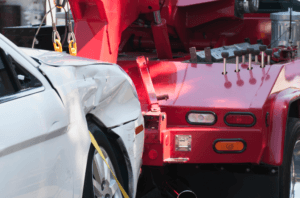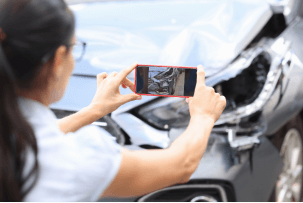
It’s common for car accident victims to be dazed and confused in the aftermath. You might be injured and need assistance. If you are able, there are certain steps you should take to protect yourself and your insurance claim. These include but are not limited to:
7 Steps To Follow After a Car Accident
- Call the Authorities for Help
- Get Medical Attention Immediately
- Exchange Contact and Insurance Details with Other Drivers
- Don’t Admit Fault or Assign Blame
- Collect Any Evidence You Can
- Contact a Qualified Attorney
- When a Car Accident Leads to Death
1. Call the Authorities for Help
If you are able, call 911 as soon as possible after the crash. Tell them where you are, how many people were involved, and any injuries or other damages that happened. If you or another individual is hurt, stay put and let the responding medical personnel evaluate the injuries.
Law enforcement officers will examine the scene and issue any necessary traffic citations. They will also submit an official report, which you can request as valuable evidence in your insurance claim. If another driver is found at fault, you can use this to negotiate with the insurance provider or providers. It will also be valuable as evidence in a personal injury lawsuit.
If possible, move the vehicles out of the way of oncoming traffic while still keeping them as close to the accident scene as possible.
2. Get Medical Attention Immediately
Even if you feel fine, have a medical checkup done by the first responders or your physician after the accident. In the aftermath of the crash, you could be in shock or experiencing a spike in adrenaline. This could mask symptoms of a more significant injury, such as whiplash or internal organ damage. In fact, there are many reasons you should go to the hospital after a car accident. Many common car accident injuries show up later, leading to more severe medical conditions that could have been avoided. In addition, having a medical evaluation within 24 hours of the crash establishes a direct relationship between your injuries and the car accident.
3. Exchange Contact and Insurance Details with Other Drivers
You are required to share your insurance coverage and contact information with anyone else involved in the crash, even though Pennsylvania is a no-fault state. This can be helpful in case you need to open a personal injury claim against them or if they provide false information.
It’s also useful to take note of the height, hair color, clothing, behaviors, and statements of the other parties to share with your attorney. If another driver admits guilt or tries to place blame on you, this can be useful for your lawyer to know.
4. Don’t Admit Fault or Assign Blame for the Accident
Although it’s natural for many people to say things like, “I’m sorry,” after an auto accident, you must resist the urge to make any statements that might make it seem like you are at fault. The authorities will investigate and determine who is responsible. By admitting guilt or even just saying you’re sorry, you will only jeopardize your case.
Likewise, don’t walk up to the other driver and insist they are to blame. It’s best to avoid even making small talk with anyone else at the scene. Besides sharing contact and insurance details, you should only communicate with the officers investigating the car accident.
5. Collect Any Evidence You Can Immediately After the Accident
You can benefit your case significantly if you can collect evidence at the accident scene, but you should only do so if you are able to do it safely and without further injuring yourself. Much of this may be cleaned up or disappear in the days after the crash, so gathering it right away helps your attorney build a strong claim. Some examples of evidence you may find right after the crash include:
Photos
You should photograph the scene, noting road conditions, skid marks, and damage to the vehicles involved. Include pictures of any debris, road signs, the weather, and damage to any other property. Your computer, cell phone, clothing, luggage, or work equipment may have been affected, so take photos of those items.
Videos
Video is a powerful component of any evidence collection. Inquire about traffic or security cameras that could have recorded the accident. Ask other drivers if they had a dashcam recording at the time of the crash. Your attorney and legal team can also scour social media sites for any video of the crash from witnesses or onlookers.
Eyewitness Accounts
The police will interview bystanders and / or other drivers who witnessed the car accident, but you should also collect their contact information. Your personal injury attorney can get in touch with them to obtain their testimony and statements about the wreck.
Your Written Record of What Happened
Your memories of the event can form a strong base for your claim, provided you write down or otherwise record what happened as soon as possible. Keep a journal after the car wreck where you document your recollection of the accident, note your doctor visits, and maintain a detailed account of your pain and suffering.
You should also keep a list of tests your doctor performs and the results, as well as keep track of all of the costs incurred due to the treatments. Be sure to make a record of your property damage with cost estimates for the repairs. Write down some current market values for replacing your vehicle, especially if it was a vintage car or had significant upgrades.
6. Contact a Qualified Attorney
Although you must notify your insurance company about your crash, it is beneficial if you call a Pittsburgh car accident lawyer first. You should not speak to an insurance provider without an experienced attorney to guide you because even your own insurance company is not truly on your side. They will try to limit what they pay you, and a good lawyer will not let this happen.
An experienced personal injury attorney will investigate and research your car accident on your behalf. They will identify every party who is liable and explain your legal options for pursuing financial compensation. Your lawyer will negotiate with insurance adjusters to secure the maximum compensation possible or take the at fault parties to court if negotiations do not result in your demands being met.
Understanding What Your Car Accident Claim Could Be Worth

A pain journal, along with other key evidence, will be essential to demonstrating why you should be compensated and how much compensation you deserve. These losses are more than just the bills victims have. They include the many ways a person’s life has been affected by the incident.
Losing a limb, suffering hearing or vision damage, or developing a permanent disability could push crash losses into millions of dollars. Every penny deserves to be repaid, including compensation for a person’s future treatment and care needs. Your car accident attorney can help you calculate all your physical and emotional damages, including:
Medical Bills
Medical bills are considered economic damage. These are losses that have a fixed price tag and can be demonstrated with a receipt or record. Every expense related to the injuries can be claimed, including many that a person might overlook. It’s likely that the largest part of your economic damage claim will be from medical bills.
Ambulance fees, surgery costs, ICU or ER bills, and travel expenses for doctor visits are valid expenses. A victim can also request reimbursement for in-home nursing care, rehabilitation facilities, and medications. Prosthetic limbs and physical therapy, plus renovation costs for a home, are valid expenses if a person suffers an amputation or paralysis.
Projected Expenses
You can also include a projection of future costs for therapy or treatment, or auto repair. This prevents victims from suffering a financial crisis if their condition worsens or if they develop a secondary issue, such as an infection.
A reputable attorney will connect you with a network of medical and automotive experts who can provide information that helps them develop an appropriate estimate of your needs.
Lost Wages and Financial Opportunities
Even minor injuries require doctor visits and getting repairs done on your vehicle. When an auto accident puts you in the hospital, you could be out of work for weeks, leaving you without income as the bills pile up.
In addition to lost pay, you lose retirement benefits, stock programs, and vacation time accrual. Staying out of work for too long can drastically impact a person’s ability to earn promotions or raises. Accident victims and their families could suffer financially for years, and the at-fault party should compensate them.
Inability to Return to Work
With catastrophic injuries, you may never return to your job or work again. Paralysis, lost bodily functions, or decreased cognitive ability can leave you with an uncertain future. You shouldn’t have to suffer dramatic financial changes because of someone else’s negligence. An aggressive legal team can work to secure a comfortable settlement or jury award for you.
Property Damage
Your vehicle may not be the only property that was damaged. Cell phones, computers, clothing, luggage, and gifts could require repair or replacement as part of your economic damages. An attorney can help you gather receipts and records of their value and current replacement costs based on comparable items. This can be especially important if the vehicle is vintage, highly customized, or a luxury automobile.
Emotional Distress and Impact on Your Personal Life
You can also seek non-economic damages, which address the emotional distress you suffer after a crash. A pain and recovery journal and witness accounts of the trauma can support your claims in this category, including details about issues including but not limited to:
- Amputation
- Anxiety
- Depression
- Isolation and loss of society
- Pain and suffering
- PTSD
- Scars and disfigurement
- Sleep disturbances
What To Do After A Car Accident Involving Death
A crash can be devastating enough, but if a crash victim passes away, their family will be left with grief on top of their expenses. Filing a wrongful death claim can assist survivors in securing compensation after a family member dies.
Families can claim funeral and burial expenses, as well as all medical and property costs incurred before the death.
You may think you can handle your own case after a crash. However, you need to concentrate on getting better and returning to your life. Managing the legal complexities of filing insurance claims or personal injury lawsuits is best left to professional attorneys with years of experience and training in these matters. It’s worth your time to invest in a free consultation to learn how a lawyer can help your case.
A trustworthy and skilled personal injury attorney in Pittsburgh will take on these tasks for you:
Preparing Your Case for Court

A car accident in Pittsburgh can cause physical and emotional trauma. The legal system can be confusing, and insurance companies want to keep their payouts small.
The experienced Pittsburgh car accident lawyers at SMT Legal can guide you through all steps of the insurance and legal processes and will seek the damages you are entitled to under Pennsylvania law. Contact us to schedule a free consultation.

